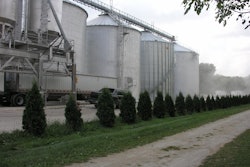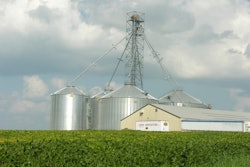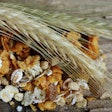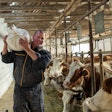Just as the first hints of frigid winter weather began hitting the Corn Belt, more than 600 country elevator managers and front-line employees traveled to Omaha, NE, for the 41st edition of the National Grain & Feed Association’s (NGFA) Country Elevator Conference and Trade Show.
The event, held Dec. 9-11, featured a day and a half of seminar sessions as well a full trade show featuring more than 100 exhibitors. The over arching theme of the conference program focused on preparing attendees for 2013 by addressing some of the hot topics of 2012.
Quality, weather concerns
The 2012 drought and its lasting affects took center stage in many of the presentation.
Unfortunately, according to Craig Solberg, senior meteorologist with Freese-Notis Weather, whose presentation “Weather/Climate Change – Impacts on U.S., World Agriculture” outlined roughly century of weather trends, the drought will likely continue into 2013 and beyond. Citing the Dust Bowl years and the severe weather conditions of the 50s, historic weather patterns indicate that the U.S. is in the middle of La Nina drought cycle.
Dr. Charles Hurburgh, professor, Agricultural and Biosystems Engineering – Iowa State University, addressed the surprisingly controlled threat of mycotoxins found during the 2012 crop year in his talk, “Maintaining Grain Quality, Controlling Mycotoxins After a Difficult Weather Year.” Hurburgh notes that while the hot, dry temperatures presented ideal conditions, the kernel integrity of hybrid corns prevented rampant aflatoxin contamination.
Staying in the vein of grain quality, “What the Supply Chain Will Be Demanding from Grain, Oilseed Suppliers,” by co-presenters Ben Warren, director - product safety and regulatory affairs, Land O’Lakes Inc., and Dr. Craig Henry, ERS director/business risk, Deloitte and Touche LLP, offered up best practices for ensuring customer confidence up and down the supply chain by using FSMA guidelines as a common sense approach to grain traceability and contamination prevention.
Financial reform
Between the brazen failure of MF Global after losing $1.6 billion in its segregated funds and the Peregrine Financial Group (PFG) scandal, confidence in the commodity futures trade took some major hits in the year -- as did the trust customers once placed on the system.
Speaking at the conference again this year, albeit under better circumstances this year, the CME Group’s COO Bryan Durkin stressed the exchange’s dedication to restoring the industry’s confidence in the system and its goal to put firm protections in place to prevent future abuses.
In the presentation, “Policy Options to Enhance Futures Protections,” co-presenters Walter Lukken, president and CEO, Futures Industry Association (FIA) and John Roe, co-founder, Commodity Customer Coalition (CCC), outlined the two paths toward protection are either a legislative or private market approach -- though a private approach, like a third-party insurance option would be in the industry’s best interest. Since the premiums to support this model would be high, all parties involved suggest the protections be optional. Multiple protection models continue to be considered, debated.
Global, domestic influencers
In the presentation “Drivers Affecting the Grain and Processing Business in 2013,” given by Bailey Ragan, vice president, Bunge NA, focused on how the rise of the global middle class will continue to bolster export markets as the demand for protein rises in developing countries.
Meanwhile, Mike O’Dea, risk management consultant, FCStone LLC, suggests agribusinesses keep an eye on the global weather throughout 2013 as the conditions in South America -- Brazil and Argentina in particular, the Ukraine and Russia will greatly impact grain stocks and the export markets. Also, China will continue to be a major player on the global grain stage.
On the home front, in his assessment of a post-election, James Wiesemeyer, senior vice president, Informa Economics, predicts that in the wake of the lame duck session, portions of the 2008 Farm Bill will be extended. For a thorough play-by-play of the presentations given at the conference, search #CEC12 on Twitter for full coverage.





















